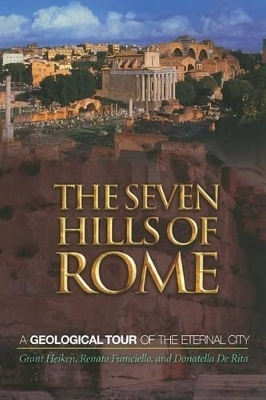
The Seven Hills of Rome
Princeton University Press (Verlag)
978-0-691-13038-5 (ISBN)
- Lieferbar (Termin unbekannt)
- Versandkostenfrei innerhalb Deutschlands
- Auch auf Rechnung
- Verfügbarkeit in der Filiale vor Ort prüfen
- Artikel merken
From humble beginnings, Rome became perhaps the greatest intercontinental power in the world. Why did this historic city become so much more influential than its neighbor, nearby Latium, which was peopled by more or less the same stock? Over the years, historians, political analysts, and sociologists have discussed this question ad infinitum, without considering one underlying factor that led to the rise of Rome--the geology now hidden by the modern city. This book demonstrates the important link between the history of Rome and its geologic setting in a lively, fact-filled narrative sure to interest geology and history buffs and travelers alike. The authors point out that Rome possessed many geographic advantages over surrounding areas: proximity to a major river with access to the sea, plateaus for protection, nearby sources of building materials, and most significantly, clean drinking water from springs in the Apennines. Even the resiliency of Rome's architecture and the stability of life on its hills are underscored by the city's geologic framework. If carried along with a good city map, this book will expand the understanding of travelers who explore the eternal city's streets.
Chapters are arranged geographically, based on each of the seven hills, the Tiber floodplain, ancient creeks that dissected the plateau, and ridges that rise above the right bank. As an added bonus, the last chapter consists of three field trips around the center of Rome, which can be enjoyed on foot or by using public transportation.
Grant Heiken is a past president of the International Association of Volcanology. He is the author or co-author of several professional and general-interest books on geology, including "Volcanoes: Crucibles of Change" (Princeton). Renato Funiciello is Professor of Geology at the University of Roma Tre and Vice President of the National Institute for Geophysics. Donatella De Rita is Professor of Field Geology and the Geology of Volcanic Areas at the University of Roma Tre.
Foreword, by Walter Veltroni vii Preface ix CHAPTER 1: A Tourist's Introduction to the Geology of Rome 1 Timelines 18 CHAPTER 2: Center of the Western World--The Capitoline (Campidoglio) Hill 27 CHAPTER 3: Palaces and Gardens--The Palatine (Palatino) Hill 37 CHAPTER 4: The Aventine (Aventino) Hill 51 CHAPTER 5: The Tiber Floodplain, Commerce, and Tragedy 59 CHAPTER 6: The Tiber's Tributaries in Rome--Clogged with Humankind's Debris 85 CHAPTER 7: The Western Heights--Janiculum, Vatican, and Monte Mario 110 CHAPTER 8: The Celian (Celio) Hill 123 CHAPTER 9: Largest of the Seven Hills--The Esquiline (Esquilino)153 CHAPTER 10: Upper Class--The Viminal (Viminale) and Quirinal (Quirinale) Hills 162 CHAPTER 11: Field Trips in and around Rome 174 The Seven Hills of Rome in Fifteen Stops 174 Panoramas, Piazzas, and Plateaus 195 A Field Trip to Rome, the City of Water 216 Acknowledgments 229 Further Reading 231 Index 237
| Erscheint lt. Verlag | 13.5.2007 |
|---|---|
| Vorwort | Walter Veltroni |
| Zusatzinfo | 20 Maps |
| Verlagsort | New Jersey |
| Sprache | englisch |
| Maße | 152 x 235 mm |
| Gewicht | 369 g |
| Themenwelt | Reiseführer ► Europa ► Italien |
| Naturwissenschaften ► Geowissenschaften ► Geologie | |
| ISBN-10 | 0-691-13038-8 / 0691130388 |
| ISBN-13 | 978-0-691-13038-5 / 9780691130385 |
| Zustand | Neuware |
| Informationen gemäß Produktsicherheitsverordnung (GPSR) | |
| Haben Sie eine Frage zum Produkt? |
aus dem Bereich


